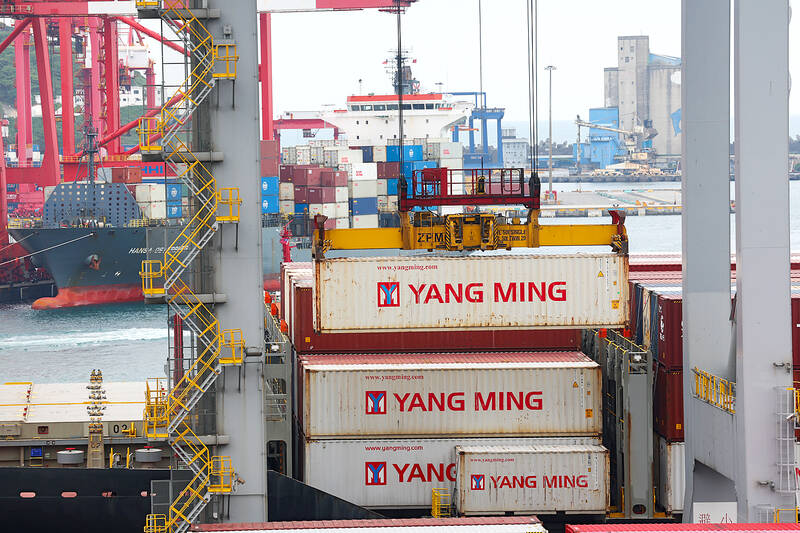Taiwan’s exports last month grew 9.2 percent from a year earlier to the second highest for a single month at US$43.59 billion, with expansion in almost all product categories, as global customers built inventory ahead of the Lunar New Year and potential tariff hikes, the Ministry of Finance said yesterday.
However, the 14-month upswing might come to a pause this month, as firms observe the nine-day Lunar New Year holiday weighing on shipments that might decline 1 to 4 percent year-on-year, Department of Statistics Director-General Beatrice Tsai (蔡美娜) said.
It is better to combine the data of January and February to gain a better understanding of real export performance, she said.

Photo: CNA
Exports in the fourth quarter of last year expanded 9.1 percent to US$125.97 billion, while exports for the whole of last year increased 9.9 percent to US$475.07 billion, both stronger than the projections in November last year by the Directorate-General of Budget, Accounting and Statistics, Tsai said.
Insatiable demand for electronics used in artificial intelligence (AI) development continued to provide business orders for local firms making chips, servers and other devices regardless of seasonality, Tsai said.
In particular, shipments of information and communications products rose 16 percent last month, 18.5 percent last quarter and 59 percent last year, the ministry’s report said.
The uptick definitely had to do with the high sales season, but some likely stemmed from rush orders intended to evade potential tariff hikes, Tsai said.
US president-elect Donald Trump has threatened to raise tariffs on all imports after his inauguration on Jan. 20, propelling shipments bound for resale in the US market before their schedule, she said.
That helped explain why exports of base metals, plastic, chemical, mineral and textile products also reported improvement, Tsai said.
Shipments of non-tech products have taken a hit from a supply glut amid listless demand in China and Europe, underlying Taiwan’s uneven recovery, Tsai said, adding that the low base last year helped fuel restocking.
Against this backdrop, Taiwan’s trade with China and Europe is losing steam, while gaining traction with the US and Southeast Asia, Tsai said.
Imports, a critical measure of exports and investment interest on the part of local firms, recorded a sharp annual increase of 30.4 percent to US$37.51 billion last month as imports of capital equipment surged 48.7 percent and semiconductor equipment advanced 53 percent from their levels the year before, the report said.
The data suggested that private investment would become a major GDP growth driver in the last quarter and beyond, Tsai said.
Taiwan recorded a trade surplus of US$6.08 billion last month, representing a 45.5 percent decline from a year earlier, the ministry said.
For the whole of last year, the trade surplus amounted to US$80.61 billion, a tiny 0.2 percent retreat annually.

NEW IDENTITY: Known for its software, India has expanded into hardware, with its semiconductor industry growing from US$38bn in 2023 to US$45bn to US$50bn India on Saturday inaugurated its first semiconductor assembly and test facility, a milestone in the government’s push to reduce dependence on foreign chipmakers and stake a claim in a sector dominated by China. Indian Prime Minister Narendra Modi opened US firm Micron Technology Inc’s semiconductor assembly, test and packaging unit in his home state of Gujarat, hailing the “dawn of a new era” for India’s technology ambitions. “When young Indians look back in the future, they will see this decade as the turning point in our tech future,” Modi told the event, which was broadcast on his YouTube channel. The plant would convert

‘SEISMIC SHIFT’: The researcher forecast there would be about 1.1 billion mobile shipments this year, down from 1.26 billion the prior year and erasing years of gains The global smartphone market is expected to contract 12.9 percent this year due to the unprecedented memorychip shortage, marking “a crisis like no other,” researcher International Data Corp (IDC) said. The new forecast, a dramatic revision down from earlier estimates, gives the latest accounting of the ongoing memory crunch that is affecting every corner of the electronics industry. The demand for advanced memory to power artificial intelligence (AI) tasks has drained global supply until well into next year and jeopardizes the business model of many smartphone makers. IDC forecast about 1.1 billion mobile shipments this year, down from 1.26 billion the prior

People stand in a Pokemon store in Tokyo on Thursday. One of the world highest-grossing franchises is celebrated its 30th anniversary yesterday.

Zimbabwe’s ban on raw lithium exports is forcing Chinese miners to rethink their strategy, speeding up plans to process the metal locally instead of shipping it to China’s vast rechargeable battery industry. The country is Africa’s largest lithium producer and has one of the world’s largest reserves, according to the US Geological Survey (USGS). Zimbabwe already banned the export of lithium ore in 2022 and last year announced it would halt exports of lithium concentrates from January next year. However, on Wednesday it imposed the ban with immediate effect, leaving unclear what the lithium mining sector would do in the